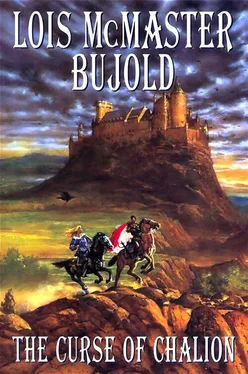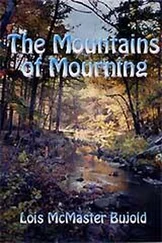Lois Bujold - The Curse of Chalion
Здесь есть возможность читать онлайн «Lois Bujold - The Curse of Chalion» весь текст электронной книги совершенно бесплатно (целиком полную версию без сокращений). В некоторых случаях можно слушать аудио, скачать через торрент в формате fb2 и присутствует краткое содержание. Жанр: Фантастика и фэнтези, на английском языке. Описание произведения, (предисловие) а так же отзывы посетителей доступны на портале библиотеки ЛибКат.
- Название:The Curse of Chalion
- Автор:
- Жанр:
- Год:неизвестен
- ISBN:нет данных
- Рейтинг книги:4 / 5. Голосов: 1
-
Избранное:Добавить в избранное
- Отзывы:
-
Ваша оценка:
- 80
- 1
- 2
- 3
- 4
- 5
The Curse of Chalion: краткое содержание, описание и аннотация
Предлагаем к чтению аннотацию, описание, краткое содержание или предисловие (зависит от того, что написал сам автор книги «The Curse of Chalion»). Если вы не нашли необходимую информацию о книге — напишите в комментариях, мы постараемся отыскать её.
The Curse of Chalion — читать онлайн бесплатно полную книгу (весь текст) целиком
Ниже представлен текст книги, разбитый по страницам. Система сохранения места последней прочитанной страницы, позволяет с удобством читать онлайн бесплатно книгу «The Curse of Chalion», без необходимости каждый раз заново искать на чём Вы остановились. Поставьте закладку, и сможете в любой момент перейти на страницу, на которой закончили чтение.
Интервал:
Закладка:
She stood silent in the candlelight.
Cazaril recalled Palli's effective entreaty. "Lady, please do not send me blindfolded into battle!"
Her lips puffed, as from a blow to the stomach; but then she shook her head in despair, whirled away, and rushed from the room. Her attendant, obviously worried to the point of exasperation, had blown out her breath and followed her.
Despite the memory of Ista's infectious agitation, Cazaril found his spirits lifted from their mire of dread by the young people's excitement as their goal neared. The road met the river that flowed out of Cardegoss, and ran alongside it as they descended into a wooded area. At length, Cardegoss's second stream joined the main. A chill draft coursed through the shaded valley. On the side of the river opposite the road, three hundred feet of cliff face erupted from the ground and soared aloft. Here and there, little trees clung desperately to crevices, and ferns spilled down over the rocks.
Iselle paused to stare up, and up. Cazaril reined his horse in beside hers. From here, one could not even see the beginnings of the human masons' puny defensive additions decorating the top of this natural fortress wall.
"Oh," said Iselle.
"My," added Betriz, joining them craning in their necks.
"The Zangre," said Cazaril, "has never in its history been taken by assault."
"I see," breathed Betriz.
A few floating yellow leaves, promise of autumn to come, whirled away down the dark stream. The party pressed their horses forward, climbing up out of the valley to where a great stone arch, leading to one of the seven gates of the city, spanned the stream. Cardegoss shared the stream-carved plateau with the fortress. The town ramparts flared back along the tops of the ravines like the shape of a boat with the Zangre at its prow, then turned inward in a long wall forming the stern.
In the clear light of this crisp afternoon, the city failed signally to look sinister. Markets, glimpsed down side streets, were bright with food and flowers, thronged with men and women. Bakers and bankers, weavers and tailors and jewelers and saddlers, together with such trades and crafts that were not required by their need for running water to be down by the riversides, offered their wares. The royal company rode through the misnamed Temple Square, which had five sides, one for each of the big regional mother-houses of the gods' holy orders. Divines, acolytes, and dedicats strode along, looking more harried and bureaucratic than ascetic. In the square's vast paved center, the familiar cloverleaf-and-tower shape of Cardegoss's Temple of the Holy Family bulked, impressively more extensive than the homey little version in Valenda.
To Teidez's ill-concealed impatience, Iselle demanded a stop here, and sent Cazaril scurrying into the temple's echoing inner courtyard to lay an offering of coins upon the altar of the Lady of Spring in gratitude for their safe journey. An acolyte took charge of it with thanks and stared curiously at Cazaril; Cazaril mumbled a brief distracted prayer and hurried back out to mount again.
Climbing the long shallow slope toward the Zangre, they passed through streets where houses of the nobility, built of dressed stone and with elaborate iron grilles protecting windows and gates, loomed shoulder to shoulder, high and square. The dowager royina had lived in one such, for a time in her early widowhood. Iselle excitedly identified three possible candidates for her childhood home, until, overcome with confusion, she made Cazaril promise to determine later which had been hers.
At last they rode up to the great gate of the Zangre itself. A natural cleft across the plateau opened just before it into a sharp shadowed crevice, more daunting than any moat. On the far side, huge boulders formed the lowest course of stones in the walls; irregular, but fitting so tightly a knife blade could not have slid between them. Atop them, fine Roknari work, its delicate traceries of geometric decoration seeming sugar rather than stone. Atop that, yet more crisp-cut stone, towering higher and higher as if men competed with the gods who had thrown up the great rock the whole edifice stood upon. The Zangre was the only castle Cazaril had ever been in where he suffered whirling vertigo standing at the bottom looking up .
A horn sounded from above, and soldiers in the livery of Roya Orico saluted as they rode across the drawbridge and through the narrow archway into the courtyard. Lady Betriz clutched her reins and stared around with her lips parted. The courtyard was dominated by a huge high rectangular tower, newest and crispest, the addition of the reign of Roya Ias and Lord dy Lutez. Cazaril had always wondered if its great size was a measure of the men's strength... or their fears. A little beyond it, almost as high, a round tower loomed at one corner of the main block. Its slate roof was tumbled in, and its tall top ragged and broken.
"Dear gods," said Betriz, staring at the half ruin, "what happened there? Why don't they repair it?"
"Ah," said Cazaril, thrown into tutorial mode, considerably more for his own reassurance than Betriz's. "That's the tower of Roya Fonsa the Wise." Known more commonly, after his death, as Fonsa the Fairly-Wise. "They say he used to walk upon it all night, trying to read the will of the gods and the fate of Chalion in the stars. On the night he worked his miracle of death magic upon the Golden General, a great storm and gouts of lightning threw down the roof, and set a fire that didn't burn out until morning despite the torrents of rain."
When the Roknari had first invaded from the sea, they had overrun most of Chalion, Ibra, and Brajar in their first violent burst, even past Cardegoss, to the very feet of the southern mountain ranges. Darthaca itself had been threatened by their advance parties. But from the ashes of the weak Old Kingdoms and the harsh cradle of the hills new men had emerged, fighting for generations to regain what had been lost in those first few years. Warrior-thieves, they made an economy of raiding; noble fortunes were not made, but stolen. Turnabout, for the Roknari idea of tax collection was a column of soldiers taking all in their winding path at sword's point, like locusts in arms. Bribe and counterbribe turned the columns back, until Chalion was become an odd interlocking dance of counting armies and armed accountants. But over time, the Roknari were pushed back north toward the sea again, leaving behind as legacy a residue of castles and brutality. At length the invaders were reduced to the five squabbling princedoms hugging the north coast.
The Golden General, the Lion of Roknar, had looked to reverse the ebb of his history. By war, guile, and marriage he had in ten blazing years united all five princedoms for almost the first time since the Roknari had landed. Barely thirty, he'd gathered a great tide of men into his hands, preparing to sweep south once more, declaring he would wipe the Quintarian heretics and the worship of the Bastard from the face of the land with fire and sword. Desperate and disunited, Chalion, Ibra, and Brajar were losing against him on every front.
More ordinary forms of assassination failing, death magic was tried upon the golden genius a dozen times and more, without result. Fonsa the Wise, from deep study, reasoned that the Golden General must be the chosen of one of the gods; no sacrifice less than that of a king could balance his thundering destiny. Fonsa had lost five sons and heirs one after another in the wars to the north. Ias, his last and youngest, was locked in bitter struggle with the Roknari for the final mountain passes blocking their invasion routes. One stormy night, taking only a divine of the Bastard who was in his confidence and a loyal young page, Fonsa had mounted his tower, locking its door behind him...
Читать дальшеИнтервал:
Закладка:
Похожие книги на «The Curse of Chalion»
Представляем Вашему вниманию похожие книги на «The Curse of Chalion» списком для выбора. Мы отобрали схожую по названию и смыслу литературу в надежде предоставить читателям больше вариантов отыскать новые, интересные, ещё непрочитанные произведения.
Обсуждение, отзывы о книге «The Curse of Chalion» и просто собственные мнения читателей. Оставьте ваши комментарии, напишите, что Вы думаете о произведении, его смысле или главных героях. Укажите что конкретно понравилось, а что нет, и почему Вы так считаете.







